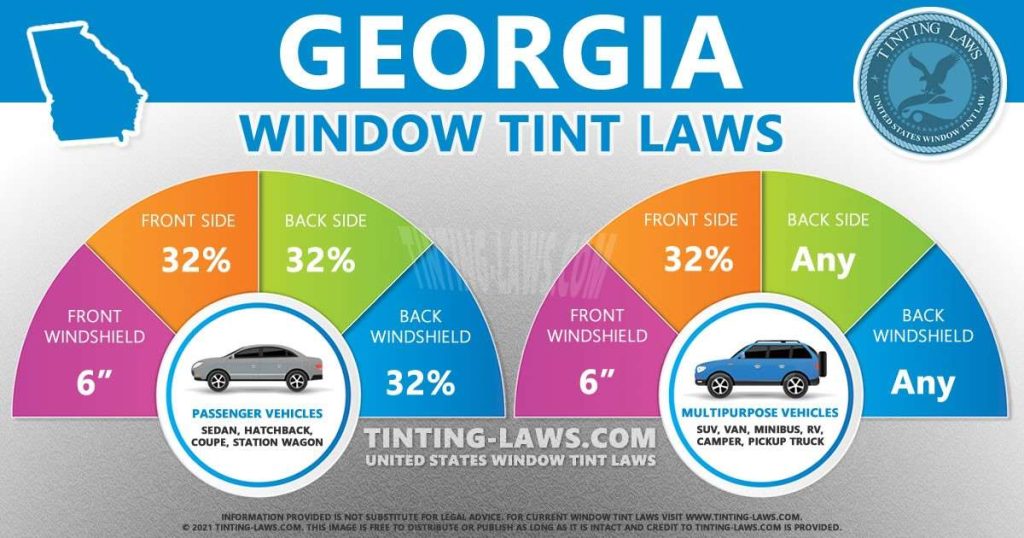Georgia Window Tinting Laws
Car window tinting laws in Georgia were enacted in 2005.
We have provided all the necessary information about your car’s window tint, including how dark or reflective the tint is allowed in your state.
There are also additional car window tinting rules and regulations in Georgia so make sure you read all about it below.
Window tint darkness in Georgia
The percent of visible light allowed through your car windows is called VLT: Visible Light Transmission.
The percentage of light allowed through your film and glass in Georgia is very specific and different for sedan cars and SUV cars or vans.
Tint darkness for sedans:
- Windshield: Non-reflective tint is allowed on the top 6 inches of the windshield.
- Front Side windows: Must allow more than 32% of light in.
- Back Side windows: Must allow more than 32% of light in.
- Rear Window: Must allow more than 32% of light in.
Tint darkness for SUV and vans:
- Windshield: Non-reflective tint is allowed on the top 6 inches of the windshield.
- Front Side windows: Must allow more than 32% of light in.
- Back Side windows: Any darkness can be used.
- Rear Window: Any darkness can be used.
Window tint reflection in Georgia
Window tint can reflect incoming light and reduce glare and heat.
Georgia window tint law permits a certain window reflection when using a tint so make sure you pay attention to this as well.
Tint reflection for sedans:
- Front Side windows: Must not be more than 20% reflective.
- Back Side windows: Must not be more than 20% reflective.
Tint reflection for SUV and vans:
- Front Side windows: Must not be more than 20% reflective.
- Back Side windows: Must not be more than 20% reflective.
Other Georgia window tint rules and regulations:
Georgia does have several other important laws, rules and regulations pertaining to window tinting. They include the following:
- Side Mirrors: No restrictions.
- Restricted Colors: The tint colors of RED and AMBER are not legal by state law.
- Tint Variance: State laws allow 3% light transmission tolerance.
- Certificates: Manufacturers of film need to certify the film they sell in the state. Make sure your dealer is using certified film.
- Stickers: The sticker to identify legal tinting is no longer required.
- Medical Exceptions: Georgia allows medical exemptions for special tint.
- Penalties: Misdemeanor punishable by a fine up to $1,000 and up to 12 months imprisonment.
Keep in mind that Georgia tinting laws and regulations may be interpreted differently in your county or place of residence.
We always recommend double-checking our information with your local DMV or law enforcement authorities.

Our information about window tint laws in Georgia was last updated in 2024.
Tinting laws in Georgia were enacted in 2005.
In case any of our info provided is not up to date or correct be sure to contact us so we can fix it. Thanks!
Trusted industry leader in providing accurate window tint laws. Share with confidence:
State of Georgia Info
Georgia is a state located in the south-eastern United States.
It was established in 1732, the last of the original Thirteen Colonies, and named after King George II of Great Britain.
Georgia is the 24th most extensive and the 8th most populous of the 50 United States.

From 2007 to 2008, 14 of Georgia’s counties ranked among the nation’s 100 fastest-growing, second only to Texas.
Georgia is known as the Peach State and the Empire State of the South. Atlanta is the state’s capital and its most populous city.
Capital: Atlanta
Population: 10,799,566
Area: 59,425 sq mi (153,909 km2)
Cities in Georgia: Atlanta, Augusta, Columbus, Savannah, Athens, Sandy Springs, Roswell, Macon, Johns Creek, Albany, Warner Robins, Alpharetta, Marietta, Valdosta, Smyrna, Dunwoody, Rome, East Point, Milton, Gainesville, Hinesville, Peachtree City, Newnan, Dalton, Douglasville, Kennesaw, LaGrange, Statesboro, Lawrenceville, Duluth, Stockbridge, Woodstock, Carrollton, Canton, Griffin, McDonough, Acworth, Pooler, Union City, Decatur, Cartersville, Sugar Hill, Milledgeville, Snellville, Forest Park, Thomasville, St. Marys, Tifton, Americus, Kingsland, uwanee, Dublin, Calhoun, Chamblee, Brunswick, Norcross, Riverdale, Conyers, Perry
Counties in Georgia: Fulton, Gwinnett, Cobb, DeKalb, Clayton, Chatham, Cherokee, Richmond, Muscogee, Bibb, Hall, Henry, Houston, Whitfield, Clarke, Forsyth, Dougherty, Douglas, Lowndes, Fayette, Floyd, Columbia, Coweta, Carroll, Paulding, Bartow, Rockdale, Glynn, Newton, Liberty, Walker, Walton, Troup, Spalding, Bulloch, Catoosa, Barrow, Laurens, Baldwin, Gordon, Camden, Thomas, Colquitt, Jackson, Tift, Effingham, Coffee, Murray, Habersham, Ware, Sumter, Oconee, Decatur, Upson, Wayne, Toombs, Madison, Haralson, Chattooga, Stephens, Lee, Mitchell, Harris, Peach, Grady, Jones, Gilmer, Bryan, Hart, Pickens, Meriwether, Tattnall, Burke, Crisp, Worth, Emanuel, Monroe, McDuffie, Washington, Lumpkin, Elbert, Franklin, White, Fannin, Butts, Dodge, Putnam, Ben Hill, Appling, Union, Jefferson, Brooks, Berrien, Dawson, Lamar, Cook, Pierce, Morgan, Screven, Dade, Rabun, Chattahoochee, Brantley, Banks, Greene, Macon, Pike, Jeff Davis, Oglethorpe, Crawford, Early, Telfair, Bleckley, Dooly, Jasper, Heard, Terrell, McIntosh, Wilkes, Twiggs, Evans, Long, Charlton, Wilkinson, Bacon, Hancock, Irwin, Pulaski, Candler, Turner, Seminole, Towns, Taylor, Wilcox, Jenkins, Johnson, Lincoln, Montgomery, Randolph, Atkinson, Lanier, Marion, Clinch, Treutlen, Talbot, Miller, Warren, Calhoun, Wheeler, Stewart, Baker, Schley, Echols, Clay, Quitman, Glascock, Webster, Taliaferro
Tint law references:
Georgia Code section 40-8-73.1: Tinting of windows or windshields
State of Georgia – Ammended Window Tint Laws